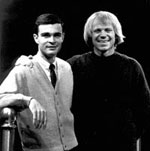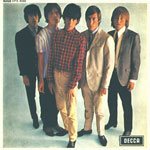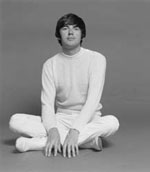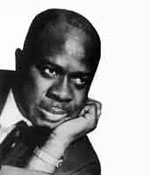
Hullabaloo mostly featured bands miming (often the singing was live over prerecorded backing tracks) to their hits and inane show biz type medleys of the current top 10 by the host and whatever musical guests were on the show. The Byrds singing part of "Do You Believe In Magic" is one of the more bizarrely entertaining medley segments with McGuinn radiating sarcasm. Gee I thought Crosby was supposed to be the asshole. I guess Crosby was the creepy one. I know traipsing through the gardens of his mind and his salacious come-ons in "Triad" always gives me the heebie-jeebies. Ah, potshots at David Crosby are too easy. Anyway at least Gene Clark (aka the most talented of the Byrds) did not disappoint, looking completely sincere and sweet throughout.
The absolute worst episodes of Hullabaloo occur when Barry "Eve of Destruction" McGuire drops in, as he can't seem to help but mug it up in truly gruesome proportions; painful grimaces, smiling way to wide at nothing in particular, and peppering everything with inappropriate maniacal laughter (as opposed to appropriate maniacal laughter). Reminds me of this line that R. Meltzer has in the Aesthetics of Rock; "the delivery of Eve of Destruction is so overwhelmingly affirmative that the overall effect is that of rendering Weltschmerz cool." I don't mean to put the show down, as there are some good moments and good guests. It's a truly odd mish mash of stuff and the over all feel is one of disorienting kinetics, a desperate stab for a good time happy feel careening off the tracks like a housewife's descent into amphetamine psychosis from one too many diet pills.

One caveat for Metamorphosis is that the version of "Memo From Turner" included, surely Jagger's finest lyrical effort, is inferior to the soundtrack version cut with Ry Cooder for the hoodoo cult movie Performance (featuring the great James Fox). Still it's interesting to hear how the song developed from this awkwardly rushed rendition to its sinister groove in the movie. The soundtrack to Performance is also well worth your time; it's a remarkably cohesive album that features along with the aforementioned definitive version of "Memo From Turner" songs by the Last Poets and Randy Newman and creepy atmospherics from Ry Cooder, Jack Nitzsche, and Merry Clayton.
Speaking of creepy, August 8th was songwriter Jimmy Webb's birthday. Webb wrote a lot of great songs that dominated the AM dial in the late 60's and depicted the daily struggles of the working class male in majestic orchestral fashion. His best-known songs are probably "Wichita Lineman", "By The Time I Get to Phoenix" and "Galveston". All three of which were hits for Glenn Campbell in rapid succession in 1967, 68 and 69. The three respective albums from which they come have been getting a lot of playtime around these parts this summer. They are all available cheap on c.d., the best of which is probably the Wichita Lineman album.

This summer I've also been watching American Masters, a PBS documentary program. In most cases it's a fine show but a recent episode on Sun Records was very disappointing, centering far too much around Ahmet Ertegun's risible idea of getting "great" modern performers to redo songs from the Sun catalogue.
I knew I was in trouble when they already had gotten to Elvis in the first 10 minutes, but things went from bad to worse when Sir Paul showed up to give a tepid performance of "That's All Right" after slapping himself on the back a little, while ungraciously accepting a compliment from D.J. Fontana. McCartney seems so shameless, and there isn't much worse than an old man try to act like a precocious and adorable youth.

The other Achilles heel of the program was, sadly, Sam Phillips himself. He's had over 40 years now to develop quite the indelible line of bullshit, a line that has become so fearsomely thick that he can speak at incredible length, pontificating in a grandiose manner and still manage to say absolutely nothing of substance. This did lead to some enjoyable moments of incongruity like when Philips stated apropos of nothing that Elvis willed his hair into being; "he didn't use any stuff in his hair." Another nonsequitur I vaguely recall was something to the effect of "I would put a woman down, for a good sound." I believe he meant put down like you do a horse, not sure, but an uncomfortable silence all around followed this comment. Easily the best part of the show was when Rufus Thomas deflated all the hot air in the room by saying "Sam Philips didn't invent nothing". Amen.
© 2005 William Crain